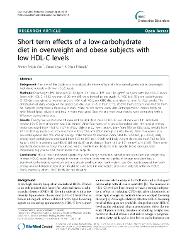| dc.contributor.author | Can, Ahmet Selçuk | |
| dc.contributor.author | Uysal, Canan | |
| dc.contributor.author | Palaoğlu, K. Erhan | |
| dc.date.accessioned | 2019-06-27T08:05:05Z | |
| dc.date.available | 2019-06-27T08:05:05Z | |
| dc.date.issued | 2010 | |
| dc.identifier.issn | 1472-6823 | en_US |
| dc.identifier.uri | https://hdl.handle.net/20.500.12469/1029 | |
| dc.identifier.uri | https://doi.org/10.1186/1472-6823-10-18 | |
| dc.description.abstract | Background: The aim of this study was to evaluate short-term effects of a low-carbohydrate diet in overweight and obese subjects with low HDL-C levels. Methods: Overweight (BMI between 25-30 kg/m(2)) or obese (BMI over 30 kg/m(2)) subjects with low HDL-C levels (men with HDL-C < 1.03 women < 1.29 mmol/l) were invited to the study. A 1400 kcal 75-gram carbohydrate (CHO) diet was given to women and an 1800 kcal 100-gram CHO diet was given to men for four weeks. The distribution of daily energy of the prescribed diet was 21-22% from CHO 26-29% from protein and 49-53% from fat. Subjects completed a three-day dietary intake record before each visit. Anthropometric indices body fat ratio blood lipids glucose and insulin were measured. Baseline and week-four results were compared with a Wilcoxon signed ranks test. Results: Twenty-five women and 18 men participated. Basal median LDL-C level of men was 3.11 and basal median LDL-C level of women was 3.00 mmol/l. After four weeks of a low-carbohydrate diet the median energy intake decreased from 1901 to 1307 kcal/day daily energy from carbohydrate from 55% to 33% body weight from 87.7 to 83.0 kg and HDL-C increased from 0.83 to 0.96 mmol/l in men (p < 0.002 for all). After four weeks of a low-carbohydrate diet the median energy intake tended to decrease (from 1463 to 1243 kcal p = 0.052) daily energy from carbohydrate decreased from 53% to 30% (p < 0.001) and body weight decreased from 73.2 to 70.8 kg (p < 0.001) in women but HDL-C did not significantly change (from 1.03 to 1.01 mmol/l p = 0.165). There were significant decreases in body mass index waist circumference body fat ratio systolic blood pressure total cholesterol triglyceride and insulin levels in all subjects. Conclusions: HDL-C levels increased significantly with energy restriction carbohydrate restriction and weight loss in men. HDL-C levels didn't change in women in whom there was no significant energy restriction but a significant carbohydrate restriction and a relatively small but significant weight loss. Our results suggest that both energy and carbohydrate restriction should be considered in overweight and obese subjects with low HDL-C levels especially when LDL-C levels are not elevated. | en_US] |
| dc.language.iso | eng | en_US |
| dc.publisher | BIOMED CENTRAL LTD | en_US |
| dc.rights | info:eu-repo/semantics/openAccess | en_US |
| dc.subject | N/A | en_US |
| dc.title | Short term effects of a low-carbohydrate diet in overweight and obese subjects with low HDL-C levels | en_US |
| dc.type | article | en_US |
| dc.relation.journal | BMC Endocrine Disorders | en_US |
| dc.identifier.volume | 10 | en_US |
| dc.identifier.wos | WOS:000297287500001 | en_US |
| dc.identifier.doi | 10.1186/1472-6823-10-18 | en_US |
| dc.identifier.scopus | 2-s2.0-78049520389 | en_US |
| dc.institutionauthor | Can, Ahmet Selçuk | en_US |
| dc.relation.publicationcategory | Makale - Uluslararası Hakemli Dergi - Kurum Öğretim Elemanı | en_US |
| dc.identifier.pmid | 21062488 | en_US |
















